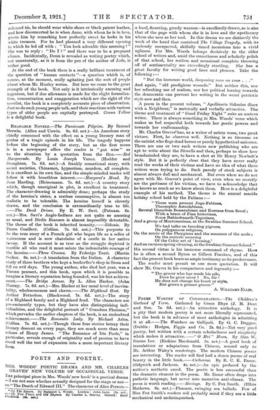READABLE NovErs.—The Passionate Pilgrim. By Samuel Merwin. (Allen and Unwin.
8s. 6d. net.)—An American story chiefly concerned with the effect on a young literary man of genius of a tragic episode in his life. The tragedy happens before the beginning of the story, but as the first scene is in a newspaper office the reader is " put wise " as to the situation by a quotation from the files.--Red Masquerade. By Louis Joseph Vance. (Hodder and Stoughton. 7s. 6d. net.)—A frankly sensational story, with secret societies, Chinamen, hypnotism, murders, all complete. It is excellent in its own line, and the simple-minded reader will follow it with breathless interest.—.Margaret's Mead. By Jane Harding. (Heinemann. 7s. 6d. net.)—A country story which, though unoriginal in plot, is excellent in treatment. The character-drawing is admirably done; perhaps the study of the heroine's sister, a restless consumptive, is almost too realistic to be tolerable. The heroine herself is cleverly drawn, and the conclusion is extraordinarily true to life. —The Devil Drives. By E. W. Savi. (Putnam. fis. net.)—Mrs. Savi's Anglo-Indians are not quite so amusing as usual, and Birdie Branson is almost impossibly detestable. The theme of the book is inherited insanity.—Sidonie. By Pierre Coalfieet. (Collins. 75. 6d. net.)—This purports to be the true story of a French girl who began life as a seller of watercress and is now chatelaine of a castle in her native r.evoy. If the account is as true as the struggle depicted is terrible all who read it must salute the indomitable courage of the heroine.—Three Crosses. By Federigo Tozzi. (Martin Seeker. 68. net.)—A translation from the Italian. A character study of three brothers who kept a bookseller's shop in Siena and fell on evil days. The young author, who died last year, was a Tuscan peasant, and this book, upon which it is possible to imagine a literary reputation being founded, was his last achieve- ment. The Bridge Across. By L. Allen Harker. (John Murray. 7s. 6d. net.)—Mrs. Harker at her usual level of inevita- bility, wholesomeness and charm.—The Highland Host. By Arthur Fetterless. (Blackwood. 7s. (id. net.)—The story of a Highland family and a Highland feud. The characters are pro-eminently types, but they have also distinguishing indi- vidualities, and the delightful portrait of " Grandma Phairson," which pervades the earlier chapters of the book, is an undoubted achievement.—The Romantic Lady. By Michael Arlen. (Collins. 7s. 6d. net.)—Though these four stories betray their literary descent on every page, they are much more than mere echoes of Henry James. " The Romance of Iris Poole," in particular, reveals enough of originality and of passion to have stood well the test of expansion into a more important literary form.










































 Previous page
Previous page